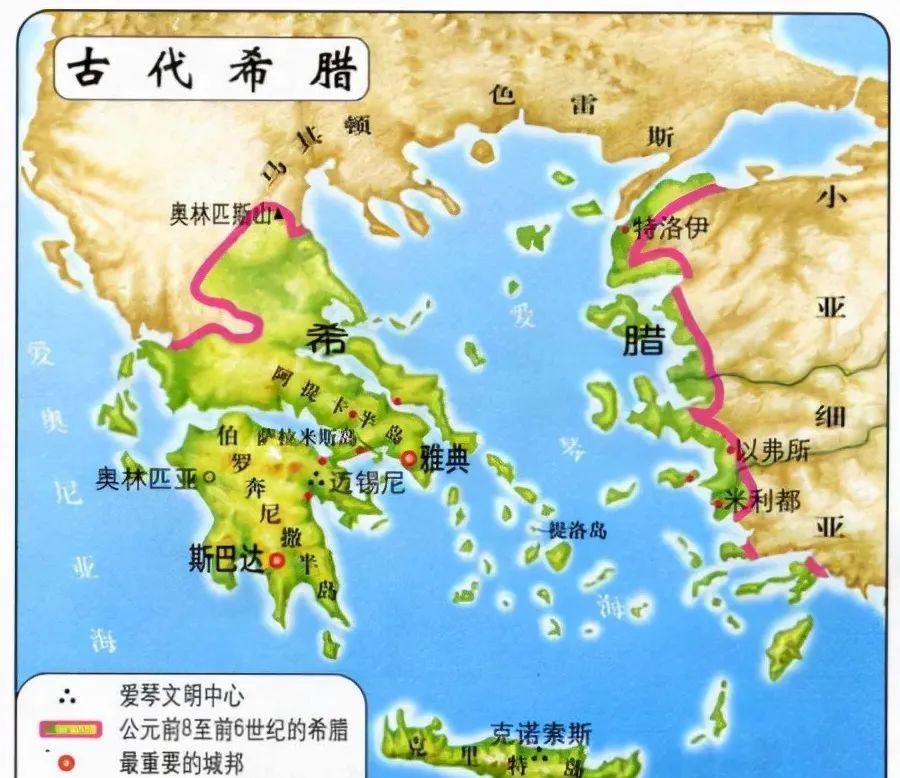Ancient Greece once gave birth to a brilliant civilization and produced a large number of great thinkers and scientists. From the Greek letters that appear from time to time in mathematics and physics, we can realize that the influence of Greek civilization on human history is really too far-reaching. Greece is known as the "cradle of European civilization."

After the Roman conquest of Greece, the era of greek city-states came to an end. However, Rome also held Greek civilization to the forefront. During the Roman Empire, Greek civilization spread widely within the Territory of the Roman Empire. Roman civilization inherited and developed Greek civilization. Thus, later historians coined the term Greco-Roman civilization. The Roman Empire also did not discriminate against the Greeks. Conversely, the Greeks, like many peoples within the Roman Empire, were recognized as Roman citizens.
However, in 1453 in the late Middle Ages, everything changed. In that year, the iron hooves of the Ottoman Turkish Empire stepped into Constantinople, the capital of the Eastern Roman Empire, and the only remaining Eastern Rome collapsed, and the Roman Empire, which lasted for thousands of years, finally stepped off the stage of history. The Greeks, on the other hand, were ruled by the ottoman Turkish Empire for centuries of darkness.
It is well known that the Ottoman Turkish Empire was Muslim, but its area of rule was ethnically diverse and had a large number of Christian inhabitants, including the Greeks. For these pagan subjects, the Turkish rulers adopted a discriminatory policy against them, expropriating them and forcing them to bear heavier servitude. The Greek people live in dire straits.
After entering the late 17th century, the Ottoman Empire gradually began to decline, and the oppression of the Greek people became more brutal. The contradictions between the Greek people and the Turkish rulers intensified. The oppression of the Turkish feudal rulers seriously hindered the development of the Greek capitalist relations of production. At the turn of the 18th and 19th centuries, the blazing fire of the Enlightenment and the French Revolution greatly promoted the spread of progressive ideas on the European continent. The Greek people gradually began to awaken. In Russia (Turkey's enemy state), the Greek diaspora formed a revolutionary group called the Friendship Society in preparation for the anti-Turkish revolution.
Finally, in 1821, the leader of the "Friendship Society" issued a password for an uprising. Subsequently, in just one year, uprisings broke out in many parts of Greece, and the flames of revolution burned everywhere in the Greek land. After a series of battles, the Greek rebels defeated the Turkish army and basically liberated the Peloponnese. In 1822, the rebels solemnly swore to the world that Greece would be independent of the Ottoman Turkish Empire. The Turkish rulers could not tolerate all this, and they mobilized their troops with the intention of counterattacking, but the results were not much.
At this time, however, there was a struggle for power within the Greek government, and the two political factions fought fiercely. In 1824, armed conflict broke out between the two major factions. The internal struggle of the Greek government had serious consequences: the revolutionary forces were weakened by infighting. The Greek government was too busy with internal struggles to take care of the war against Turkey. Turkey seized the moment and prepared to wipe out the Greek rebels in one fell swoop.
At this time, the Turkish vassal Egypt also responded to turkey's call and sent nearly 100,000 troops to the Peloponnese in 1825 to assist the Turkish army in suppressing the Greek people. The Greek army resisted bravely, but was still defeated by the Egyptian army. The Turkish-Egyptian coalition forces attacked the city and plundered the land. In the face of the Turkish-Egyptian offensive, the two major factions within the Greek government had to suspend infighting, but it was too late. By the summer of 1826, most of Greece was under the control of the Turkish-Egyptian forces.
However, because of the importance of Greece's strategic location, the Greek War of Independence has aroused close attention from the European powers. The Russian government hoped to take advantage of the Greek Revolution to expand its power. The British government did not want to see a significant expansion of Russian power, so it made a request to Russia to negotiate the spheres of influence of both sides.
In 1826, Britain and Russia signed an agreement on the Greek question. Not to be outdone, the French government, which had been eager to regain its international influence after the Napoleonic Wars, also signed the treaty in the summer of 1827. Subsequently, Britain, France, and Russia issued a note demanding a ceasefire between Turkey and Greece, otherwise the three countries would interfere. Turkey refused. The three countries then formed a combined fleet and prepared to intervene by force. In October 1827, the Combined Fleet of the Three Powers defeated the Combined Turks and Egypt at the Gulf of Navarino. As a result, the Turkish-Egyptian coalition forces on land lost their cover at sea and their strength was greatly frustrated. The following year, the Russian army sent troops to the Balkan Peninsula and defeated the Turkish army one after another. In 1829, Turkey had to make peace with Britain, France and Russia.
The intervention of the European powers was naturally for their own benefit, but objectively it did help the revolutionary struggle of the Greek people. Seizing the favorable opportunity of the intervention of the European powers, the Greek military and civilians began a counter-offensive and recaptured many lands. In 1830, Turkey finally recognized Greek independence, and the Greek War of Independence, which lasted more than eight years, finally ended in the victory of the Greek people.
Since then, Greece, the cradle of European civilization, has been freed from the slavery and oppression of the Ottoman Turkish Empire for more than 300 years and has turned a new page in history.